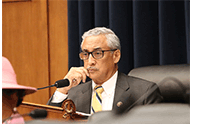USDE Negotiated Rulemaking Session Meets in Washington, DC
In This Issue:
- U.S. Department of Education Negotiated Rulemaking Session Meets in Washington, DC
- House Education Committee to Hold Hearings on Higher Education
U.S. DEPARTMENT OF EDUCATION NEGOTIATED RULEMAKING SESSION MEETS IN WASHINGTON, DC
 The U.S. Department of Education (USDE) held the second of four sessions of its negotiated rulemaking on accreditation and other topics on February 19-22, 2019 in Washington, DC. Negotiated rulemaking is the process used by USDE for stakeholder representatives to meet with USDE to negotiate the terms of a proposed administrative rule or regulatory change. The first session of the negotiated rulemaking met January 14-16, 2019, with the third session scheduled to meet March 25-28, 2019. A fourth session has been added, scheduled for April 1-3, 2019. All sessions are being held in Washington, DC.
The U.S. Department of Education (USDE) held the second of four sessions of its negotiated rulemaking on accreditation and other topics on February 19-22, 2019 in Washington, DC. Negotiated rulemaking is the process used by USDE for stakeholder representatives to meet with USDE to negotiate the terms of a proposed administrative rule or regulatory change. The first session of the negotiated rulemaking met January 14-16, 2019, with the third session scheduled to meet March 25-28, 2019. A fourth session has been added, scheduled for April 1-3, 2019. All sessions are being held in Washington, DC.
This rulemaking addresses higher education accreditation and innovation, distance learning and educational innovation, faith-based entities’ participation in Title IV programs and TEACH Grants. A main committee focuses on accreditation while three subcommittees address the additional issues. All decisions about consensus will be made by the committee itself, not the subcommittees. In advance of the negotiated rulemaking, USDE issued proposed changes to accreditation regulation to be considered; these proposed changes have subsequently been modified through the negotiations with USDE.
At the February 19-22 session, the committee received reports from each of the subcommittees, responded to questions posed by USDE and addressed several proposed regulations, including:
- Permitting accrediting organizations to waive certain criteria for institutions to encourage innovation.
- Transfer of credit among institutions.
- Limiting the number of states in which a regional accrediting organization could operate.
- Establishing a definition of “regular and substantive interactions” in distance education, as well as definitions of phrases such as “monitoring reports” and “substantial compliance.”
- Protecting religious mission at faith-based institutions.
- Transparency of the accreditation process, including making accreditation reports public.
Change of allowable scope for regional accrediting organizations and transfer of credit issues generated significant debate among committee members. The committee continues its negotiations and has not reached a decision on any of the issues discussed.
HOUSE EDUCATION COMMITTEE TO HOLD HEARINGS ON HIGHER EDUCATION
 On February 21, 2019, the House Committee on Education and Labor announced plans to hold a series of hearings on higher education. A statement from Committee Chair Bobby Scott (D-Virginia), joined by Ranking Member Virginia Foxx (R-North Carolina), said that the announcement marks the formal start of an effort to reauthorize the Higher Education Act (HEA) during the 116th Congress. The hearings will address the cost of college; strengthening accountability for higher education; the cost of non-completion; the role of community colleges, historically black colleges and universities and minority-serving institutions in preparing students for success; and innovation. Dates for the hearings have not yet been announced.
On February 21, 2019, the House Committee on Education and Labor announced plans to hold a series of hearings on higher education. A statement from Committee Chair Bobby Scott (D-Virginia), joined by Ranking Member Virginia Foxx (R-North Carolina), said that the announcement marks the formal start of an effort to reauthorize the Higher Education Act (HEA) during the 116th Congress. The hearings will address the cost of college; strengthening accountability for higher education; the cost of non-completion; the role of community colleges, historically black colleges and universities and minority-serving institutions in preparing students for success; and innovation. Dates for the hearings have not yet been announced.

